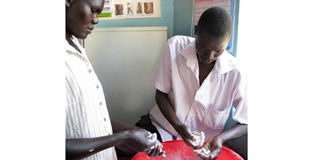Over 1,000 HIV/Aids patients shun medication - medics

Lending a hand. Volunteers pack drugs for HIV patients at Amach Health Centre IV in Lira District in 2012. More than 1,000 HIV/Aids patients in Lira and Apac districts have reportedly shunned medication. PHOTO BY BILL OKETCH
What you need to know:
- HIV stigma. Authorities say apart from the psychological torture of testing positive, some patients fear the side effects of ARVs.
A total of 1,094 HIV/Aids patients enrolled on anti-retroviral treatment in Apac and Lira districts have reportedly shunned medication.
Health workers and local leaders say the group only return to health facilities after their health deteriorates.
Ms Dorcus Arao, the spokesperson of RHITES, N-Lango project, an organisation sponsored by United States Agency for International Development (Usaid), said more than 5,000 HIV patients had dropped out in the previous years.
However, she said RHITES, N-Lango has convinced many patients to resume treatment.
“We did an analysis to find out why some patients were not going back for treatment and found that most of the reasons were associated with nutrition issues, which our project is now addressing,” she said yesterday.
Ms Arao added: “We are able to call and follow up our patients to remind them on their appointment date, and at every health centre, we have facilitators who follow them up to their villages.”
The Apac acting District Health Officer (DHO), Mr Leone Oceng, warned that skipping medication is dangerous.
He explained that those who dropped out of ARVs are at a high risk of acquiring infections such as tuberculosis, malaria and diarrhoea, among others.
“During the time a person is on anti-retroviral (ARV) drugs, the virus in blood reduces because it hides in the born marrow, making the body to develop a strong immunity, and when a person drops out of drugs, the virus multiplies quickly,” he explained.
“The virus then comes back strongly and weakens the immunity of the body,” he added.
Mr Augustine Okello, the Apac acting HIV focal point person, said the district is using community strategies to follow up HIV patients.
“We are using some HIV patients who have volunteered to go out there and talk to their colleagues to come back for treatment,” he said.
However, he noted that when a person is tested positive for the first time, he or she gets psychologically tortured.
Mr Emmanuel Nengo, an interpersonal communication agent working with RHITES, N-Lango, however, blamed the problem on inadequate counselling services.
“During community outreach programmes, some people are enrolled on ARVs without being sensitised about the side effects,” he said.
Mr Tonny Jasper Odongo, the Apac secretary of health and education, advised HIV patients to value their lives and continue with treatment.
“Those with tuberculosis are also endangering the community. We shall look for them if they keep hiding,” Mr Odongo said.
Need for sensitisation
He appealed to local leaders to continue sensitising the community. “At every gathering, we should talk about HIV/Aids and encourage people to test their blood,” he said.
Mr Richard Epenu, an enrolled nurse, said in Lira District, some HIV patients had defaulted on taking antiretroviral treatment.
He said at least 20 out of 520 people who are enrolled on medication at Agali Health Centre have since defaulted on anti-retroviral treatment.
“Because of lack of transport, we are failing to follow up on HIV patients who have defaulted on treatment,” he said.
HIV Prevalence IN APAC
At least 80,690 people living with HIV/Aids in Apac District are enrolled on medication but of these, a total of 1,094 no longer visit the health facilities to pick their monthly dosage, according to Usaid’s RHITES, N-Lango project.
RHITES, N-Lango project is being implemented in all the nine districts in Lango Sub-region.



